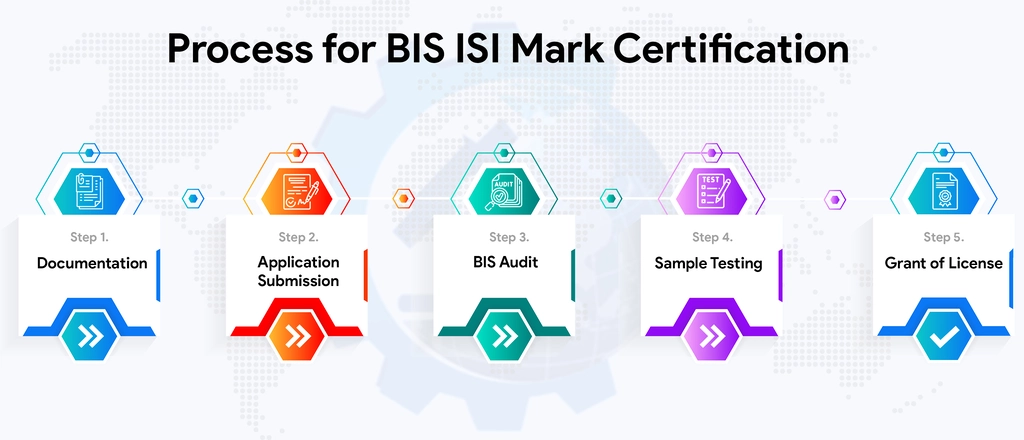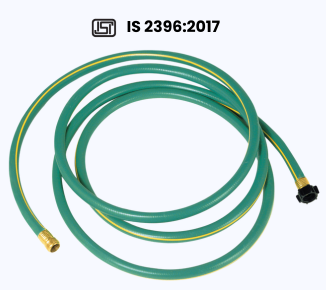BIS CERTIFICATION PROCESS INFORMATION for Rubber Hoses and Hose Assemblies for Measured Fuel Dispensing IS 2396
Introduction
This standard covers rubber and thermoplastic hoses for metered fuel delivery, which plays an important part in such vital industries as petroleum, automotive, and transportation; therefore, this calls for assurance in their safety and efficiency during the fuel transfer process. The IS 2396:2017 standard covers the requirements of rubber hoses and hose assemblies for use in fuel dispensing applications and is identical with ISO 5772:1998. Certification by BIS is essential for this standard, which manufacturers have to comply with in terms of regulatory compliance that their products are assured for safety, reliability, and long life.
Certification ensures that the hose meets critical safety and quality standards that prevent leakages, accidents, or contamination of fuel during transfers. BIS certification ascertains that a product meets national regulations and is fit for deployment in very critical applications. Due to the high demand for fuel-dispensing systems found in industries such as transport, automotive services, and fuel retail, the requirement for certified, high-quality hoses is quite high. Market potential is considerably strengthened by BIS certification through assurance of compliance and reliability. End-Uses of the Product
- Fuel dispensing stations
- Industrial fuel transfer systems
- Transportation fuel systems
- Portable fuel dispensing units
Overview of IS 2396:2017
IS 2396:2017 specifies the requirements for rubber hoses and hose assemblies used for measured fuel dispensing. This standard aligns with ISO 5772:1998 and covers aspects such as material specifications, performance requirements, safety, and durability.
Key Aspects of IS 2396:2017
- Material and Construction: The hoses must be made from specified grades of rubber, reinforced with textile layers, ensuring flexibility and strength.
- Performance Standards: The standard defines parameters like burst pressure, flexibility, tensile strength, and resistance to wear and weathering.
- Safety Guidelines: Safety features include ensuring secure hose connections, minimizing risks of fuel leakage, and preventing contamination during dispensing.
- Durability and Resistance: The hoses must withstand exposure to fuels, UV radiation, and environmental conditions while maintaining their performance over extended periods.
Key highlights
| Product Name | Rubber Hoses and Hose Assemblies for Measured Fuel Dispensing |
| Applicable Indian Standard | IS 2396:2017 (aligned with ISO 5772:1998) |
| Applicable Certification Scheme | Product Certification Scheme (ISI Mark Scheme) Scheme 1 |
| Applicable Mark: | BIS Standard Mark (ISI Logo) |
| Compliance Requirement | Mandatory |
| Quality Control Order | Click here |
| Ministry | Ministry of Petroleum and Natural Gas |
| Scope as per Standard | IS 2396:2017 covers the quality and safety standards for rubber hoses and hose assemblies designed for measured fuel dispensing, focusing on durability, safety, and compliance. |
Applicable Tests
- Internal diameter
- Internal diameters and tolerances
- Minimum thickness of lining and cover
- Cut Lengths
- Proof pressure
- Burst pressure
- Volumetric expansion
- Adhesion between components on: a) unaged hoses, b) aged hoses.
- Ambient -temperature flexibility
- Tensile strength: a) Lining b) Cover.
- Elongation at break, a) Lining b) Cover
- Accelerated ageing: a) Tensile -strength change for lining and cover, b) Elongation at break change for lining and cover
- Abrasion resistance (cover compound)
- Resistance to liquids: a) Lining swell b) Lining extracted matter c) Cover swell
- Electrical resistance using electrically conducting compounds
- Pull-off test

Note
For Detailed Information about the Procedure for BIS ISI Certification, Visit :
Timeline for BIS Certification
The approximate timeline to obtain BIS certification for Rubber Hoses and Hose Assemblies for Measured Fuel Dispensing to use the ISI mark as per IS 2396:2017 is as follows:
- For Indian Manufacturers (Standard Timeframe – 30 days)
- For Foreign Manufacturers (Standard Timeframe – 180 days)
Benefits of BIS Certification
BIS certification offers several significant benefits:
| Benefit | Description |
|---|---|
| Access to the Indian Market | BIS certification is mandatory for selling rubber hoses in India, ensuring that products meet national safety and quality standards. |
| Compliance with Indian Standards | Certified products comply with IS 2396:2017, ensuring safety, reliability, and performance consistency. |
| Enhanced Product Credibility | Certification provides assurance of quality and safety, enhancing trust among buyers and end-users. |
| Increased Customer Trust | Certified products are preferred by customers due to the assurance of consistent performance and compliance with safety standards. |
| Benefits for MSMEs | For small and medium enterprises, BIS certification provides opportunities to compete effectively in the market by offering certified products. |
Case Studies
A manufacturer of rubber hoses for fuel dispensing sought BIS certification to enhance product quality and gain access to the regulated Indian market. By obtaining certification under IS 2396:2017, the company not only improved its product’s marketability but also saw an increase in customer trust and repeat business. The certified hoses performed consistently across diverse applications, leading to a strong market presence and business growth.
Conclusion
Obtaining the BIS certification of rubber hoses and hose assemblies under IS 2396:2017 is, therefore, very important for any manufacturer who would like to meet regulatory requirements and also provide high-quality, reliable products in the Indian market simultaneously. This certification confers several advantages in terms of guaranteeing of product safety, increasing the marketability of the products, and gaining customer confidence in the product. Aleph India acts as a critical enabler in this respect by aiding the manufacturers of rubber hoses and hose assemblies through their BIS certification process for IS 2396:2017 by using vast resources in knowledge with respect to Indian standards and making sure that the products bear all those aspects that are required for success.
For more updates and detailed procedures, stay connected with Aleph INDIA and ensure your products are always compliant and top-quality.
Frequently Asked Questions
International Audits & Participation
Testimonials
BIS REGISTRATION FOR ELECTRONIC & IT PRODUCT
In the era of globalization, world trade is growing rapidly and henceforth, Manufacturing and Import/Export businesses are also growing drastically...View More
BIS CERTIFICATE FOR FOREIGN MANUFACTURER
The Economy of India-the fastest developing economy on the globe with the capabilities that help it matches up with the biggest international...View More
PRODUCT CERTIFICATION SCHEME (ISI MARK) FOR DOMESTIC MANUFACTURERS
Anything a person buys from food to cars, clothes to electronics, branded to unnamed products there is always a question that wanders in one’s...View More
WIRELESS PLANNING AND COORDINATION (WPC)
WPC: Wireless means communication done from one point to another point without the wires and cables. Electromagnetic waves carry the ...View More
BUREAU OF ENERGY EFFICIENCY (BEE) CERTIFICATE
BEE CERTIFICATE: Energy is the future, and its conservation is the way of the bright future. Everyone claims the environment is important...View More
E-WASTE MANAGEMENT
E-waste is one of the world's fastest-growing trash streams. We currently manufacture almost 50 million tones of it each year...View More
View All Services
Request a call back.
Would you like to speak to one of our Senior Technical advisers over the phone? Just submit your details and we’ll be in touch shortly. You can also email us if you would prefer.






























